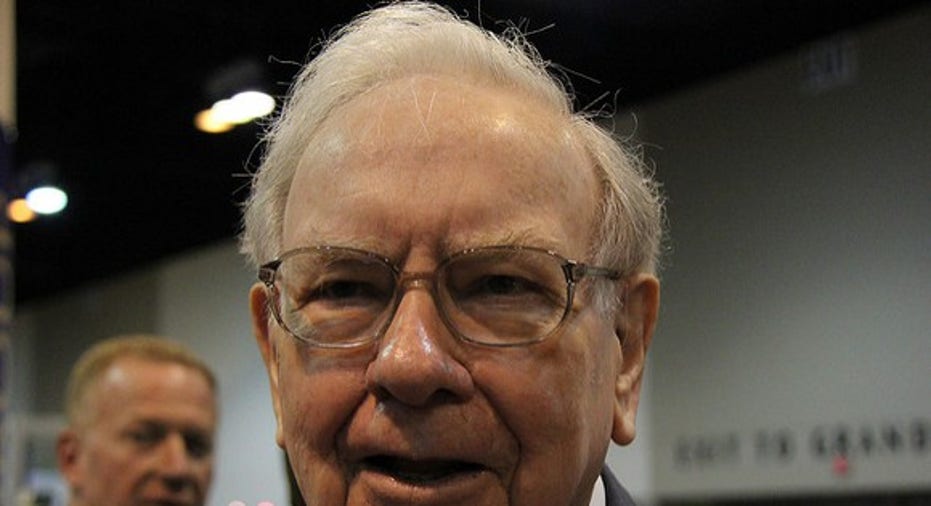Why Warren Buffett Dumped AT&T

According to Berkshire Hathaway's latest SEC filing, the company sold its entire AT&T stake during the first quarter of 2016. However, there's not necessarily anything wrong with AT&T that caused Berkshire to head for the exits. Rather, the reason for getting rid of AT&T is simple -- it's not a Buffett stock.
Berkshire never actually bought AT&T
Warren Buffett never bought AT&T shares for Berkshire, nor did the company's other stock pickers. Instead, the AT&T stake was acquired through an acquisition.
In 2011, Berkshire began to accumulate a position in DirecTV, which it added to several times afterwards. The investment turned out to be quite profitable -- most of the DirecTV shares were acquired in the mid-$40s, while AT&T's acquisition paid shareholders $95 per share.
However, only $28.50 of that amount was in cash, with the remainder payable in AT&T stock, which is where Berkshire's AT&T stake originated. After the sale was complete, Berkshire received 59.32 million shares of AT&T during the third quarter of 2015, but they didn't stay in the portfolio for long. Berkshire unloaded 12.7 million of them during the fourth quarter, and sold the rest during the first quarter of 2016.
Why AT&T didn't fit Berkshire's portfolio
In a nutshell, AT&T is a completely different investment than DirecTV was. The company was a dominant player in satellite television with only one serious competitor DISH Network -- which is much smaller, plus DirecTV operated at significantly better margins. Buffett loves companies with a wide economic moat like this. The company also had strong growth potential, especially in Latin American countries.
In contrast, AT&T isn't a high-potential company. The growth opportunities in AT&T's core businesses are rather limited, and in fact, some of the company's business is declining. During the first quarter alone, AT&T lost 54,000 video customers after factoring in the 328,000 new DirecTV subscribers, and also lost 363,000 postpaid wireless subscribers. In fairness, these two numbers don't tell the full story of AT&T's quarter, but numbers like this are a cause for concern -- especially to growth-seeking investors like Berkshire.
Now, there's nothing wrong with AT&T as an investment. It pays an excellent dividend, it's a market leader, and isn't a volatile stock. In full disclosure, I actually own AT&T in my IRA. However, it doesn't really fit in with Berkshire's investment strategy of buying undervalued stocks with lots of growth potential. Once the acquisition was finalized, it seemed like Berkshire was content to simply collect its DirecTV profits and move on.
What will Berkshire do with the money?
Some of the first-quarter selling activity helped fund stock purchases. In fact, Berkshire's newly acquired Apple stake and its increase in its Phillips 66 position totaled more than $2 billion. However, the company sold nearly $7 billion worth of its stock portfolio during the quarter including the sale of virtually all of the $4.3 billion Procter & Gamble stake as well as some Wal-Mart and MasterCard shares, so there's definitely some excess cash available.
Berkshire may be planning to add to some of its existing stock investments with the proceeds, or buy entirely new ones. Shortly after buying Apple, the tech giant's share price dropped by more than 15%, so I wouldn't be surprised to learn that Berkshire added to its position -- just to name one possibility.
Or, the company could be trying to build up a cash reserve in order to make some acquisitions. Buffett recently said that the company's future acquisitions will be rather large, similar in size to the $32 billion Precision Castparts purchase earlier this year. Since Berkshire likes to have an 11-figure bank account at all times, it could have sold some of its more "undesirable" stock positions to raise cash for this purpose.
Whatever the reason, the sale of AT&T and others during the first quarter was made for a classic Buffett reason. The company simply felt it could put this capital to better use elsewhere.
The article Why Warren Buffett Dumped AT&T originally appeared on Fool.com.
Matthew Frankel owns shares of Apple, AT&T, and Berkshire Hathaway (B Shares). The Motley Fool owns shares of and recommends Apple, Berkshire Hathaway (B Shares), and MasterCard. The Motley Fool has the following options: long January 2018 $90 calls on Apple and short January 2018 $95 calls on Apple. The Motley Fool recommends Procter & Gamble. Try any of our Foolish newsletter services free for 30 days. We Fools may not all hold the same opinions, but we all believe that considering a diverse range of insights makes us better investors. The Motley Fool has a disclosure policy.
Copyright 1995 - 2016 The Motley Fool, LLC. All rights reserved. The Motley Fool has a disclosure policy.



















